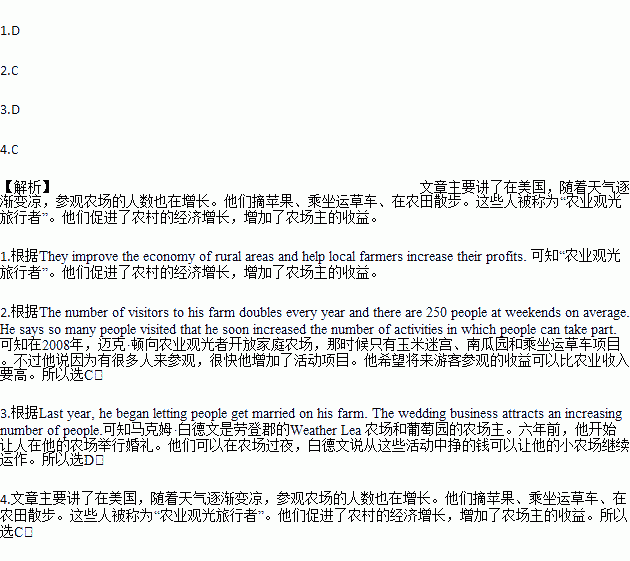题目内容
As the weather cools across the United States, a growing number of Americans visit farms. They harvest apples, enjoy hay wagon rides and walk in the fields. These people are called agri-tourists. They improve the economy of rural areas and help local farmers increase their profits. It is reported that Americnas spent more than $700 million on the agri-tourism activity in the United States last year.
On Mike Dunn’s farm, school children are laughing and playing. They come to have a hands-on experience of what it’s like to be on a farm. In a corn field maze, the corn is cut into tricky passageways that make it hard to find a way out. Their teacher says they come around once a year.
When Mike Dunn opened the family farm to agri-touists, he had only a corn maze, a pumpkin field and hay wagon rides. The number of visitors to his farm doubles every year and there are 250 people at weekends on average. He says so many people visited that he soon increased the number of activities in which people can take part. The agri-tourism earnings might be 30 percent of the entire farm income. He hopes he will make a larger profit form visitors than from farming someday.
In Loudoun County, Virginia, there are farms where grapes are grown for use in making wine. Many of the farms let people visit and drink the wine that is make there . Malcolm Baldwin owns a vineyard in Loudoun County. Last year, he began letting people get married on his farm. The wedding business attracts an increasing number of people. It’s the best choice for the young couple to spend the big day. They can also stay overnight. Mr Baldwin says the money he makes from these activities lets him keep his small farm operating.
1.What can we learn about the agri-tourism activity in America?
A. It is available throughout the year.
B. It is for Americans to help farmers grow crops.
C. It brings a lot of trouble to the local environment.
D. It has a good effect on the development of rural areas.
2.Why did Mike Dunn add more activities for agri-tourism?
A. because he earned little money from farming.
B. Because people were losing interest in previous activities.
C. Because more and more tourists visited his farm.
D. Because agri-tourism was the only source of his income.
3.What’s the most attractive activity in Mr. Baldwin’s vineyard?
A. Making wine. B. Tasting wine.
C. Sleeping for the night. D. Holding wedding ceremonies.
4.What’s the best title for the text?
A. The new way for Americans to travel
B. How to make money from agri-tourism
C. Agri-tourism is popular with Americans.
D. Go to the family farms to enjoy yourself.


